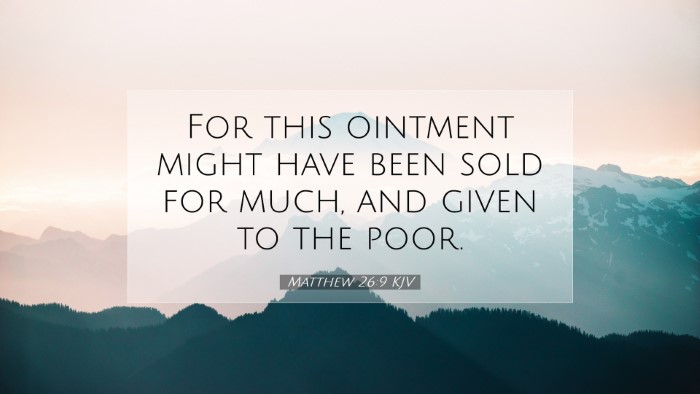Commentary on Matthew 26:9
Verse Context: Matthew 26:9 states, “For this ointment might have been sold for much, and given to the poor.” This verse is taken from the account of a woman anointing Jesus with precious ointment, wherein Judas Iscariot expresses concern over the wastefulness of the act. This moment is significant in highlighting themes of devotion, sacrifice, and the contrasting values of the world and the Kingdom of God.
Introduction to the Significance
This verse serves as a pivotal point in the understanding of sacrificial love as exhibited by the woman. It also exposes the duplicity of Judas Iscariot. Through notable commentaries, scholars can enhance their understanding of this scripture's theological implications.
Insights from Matthew Henry
- Honor to Christ: Matthew Henry points out that the act of anointing Jesus was a profound expression of honor and reverence. The woman understood the significance of Jesus’ impending death and showcased her love in a tangible manner.
- Criticism of Generosity: Henry explains Judas's comment as a reflection of a heart not aligned with Christ’s teachings. His protestation about the wastefulness of the ointment reveals his selfish motives, ultimately framing his larger betrayal.
- Importance of Intent: Furthermore, Henry emphasizes that God looks not merely at the deed but at the intent behind the action. In this case, the intention of the woman was rooted in love and worship, overshadowing the financial worth of the act.
Insights from Albert Barnes
- Value of Spiritual Acts: Albert Barnes discusses the juxtaposition of worldly value versus spiritual value. The ointment, which materially could have benefited the poor, was used in a sacrificial offering to honor Christ—pointing out that spiritual acts often transcend monetary value.
- Critique of Hypocrisy: Barnes also notes that Judas's objection was hypocritical. Although he presented a guise of concern for the poor, his greed was the true motivator behind his words, shedding light on the importance of true motives in ministry.
- Christ's Response: Barnes remarks on the significance of Jesus’ defense of the woman, stating that such acts of love will always be remembered. This underscores the idea that in the economy of God's grace, acts of love and service to Christ hold eternal value.
Insights from Adam Clarke
- Luxury vs. Need: Adam Clarke elaborates on the cultural perspective of using such precious ointment. He posits that while poverty was prevalent, the act of devotion transcended the societal need, enabling a rare expression of love towards Christ.
- Judas's Character: Clarke's analysis delves into Judas's character, suggesting that his initial pretense of caring for the poor pointed to a larger spiritual depravity that culminated in betrayal. He looks at the internal battle between devotion and betrayal.
- The Lasting Impact: Clarke concludes that Christ’s recognition of the woman’s act highlights the blessing of selfless devotion, which elevates one's standing in God’s eyes. This reinforces the message that sacrificial love has an everlasting impact.
Theological Implications
This passage offers profound insights into the nature of true worship and the differentiation between selfless love and selfish ambition. The contrast between the woman’s act and Judas’ criticism can serve as a reflective mirror for believers examining their own motivations and actions in ministry.
Key Themes for Study
- Devotion to Christ: Explore how true devotion may differ from societal expectations and the implications of sacrificial love.
- Motivation and Intent: Consider the scriptural principle that God examines the heart rather than the act, encouraging deeper self-reflection in ministry contexts.
- The Role of Generosity: Assess how believers can balance acts of generosity toward those in need while still allocating time and resources to honor God through worship.
Conclusion
Matthew 26:9 encapsulates a powerful narrative on the nature of love, sacrifice, and the eternal significance of actions taken in true devotion to Christ. The insights from Henry, Barnes, and Clarke not only enrich understanding but encourage believers to reflect on their priorities in light of the eternal values of the Kingdom of God.


